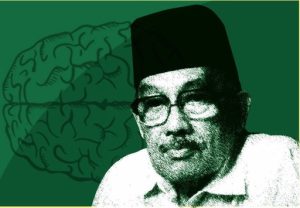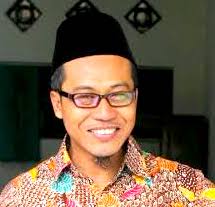Ahmad Farouk Musa & Piet Hizbullah Khaidir || 1 March 2024
Abstract
Sufism is the mystical form of Islam that emphasizes spirituality which is commonly seen as irrational. Conversely, rationalism (mu’tazilism) stresses the rational dimension of Islam. Is philosophical or rational sufism then an oxymoron? Surprisingly, Harun Nasution manages to reconcile the two seemingly opposite dimensions in Indonesian Muslims’ way of thinking and weltanschauung. Genealogically, his thought emerged in four stages: firstly, his religious upbringing during childhood; secondly, the impact of Muhammad Abduh’s rationalism on his progressive thought which challenged the Ash’arite school of theology in Indonesia; thirdly, his sufistic spiritual practices (riyāḍah) as he engaged in dhikr (remembrance of Allah) and embraced a simple lifestyle; and finally, the influence of his much-criticized rational approach similar to the Mu’tazilites on Indonesian Islamic thought. This study uses the historical-phenomenological theory to investigate the influence of neo-Mu’tazilism on Nasution’s thought and its impact on the struggle for Islamic reformation.
Keywords: Harun Nasution, sufism, rationalism, Islamic thought in Indonesia, neo-Mu’tazilism
Introduction
 Harun Nasution was a well-known presence in the Sufi circle in Indonesia. Donned in his white clothes and thick glasses, he was an unmistakable sight every Friday right before the congregational Jumu’ah prayer at the Fathullah Mosque of Syarif Hidayatullah State Islamic University, Jakarta. Huddled in the left corner of the first row of attendees, Nasution could be seen completely dissolved in dhikr or solemnity of remembrance of Allah.[1] Since dhikr is the embodiment of Sufi practice, Nasution’s embrace of sufism certainly raises eyebrows given that his Islamic thought is widely known to be aligned with the Mu’tazilite camp.
Harun Nasution was a well-known presence in the Sufi circle in Indonesia. Donned in his white clothes and thick glasses, he was an unmistakable sight every Friday right before the congregational Jumu’ah prayer at the Fathullah Mosque of Syarif Hidayatullah State Islamic University, Jakarta. Huddled in the left corner of the first row of attendees, Nasution could be seen completely dissolved in dhikr or solemnity of remembrance of Allah.[1] Since dhikr is the embodiment of Sufi practice, Nasution’s embrace of sufism certainly raises eyebrows given that his Islamic thought is widely known to be aligned with the Mu’tazilite camp.
Mu’tazilism was a theological movement that appeared in early Islamic history and flourished in Basra and Baghdad (8–10th century). Mu’tazila school developed an Islamic type of rationalism based around five fundamental principles (Al-Usul Al-Khamsa): (1) At-Tawhid – Divine Unity, (2) Al-‘Adl – Divine Justice, (3) Al-Wa’d wal-Wa’id – the promise and the warning, (4) Al-Manzilah bayna al-Manzilatain – the intermediate position, and (5) Al-‘Amru bil-ma’ruf wa an-Nahyu ‘an-al-Munkar – advocating the good and forbidding the evil. Muʿtazilites are best known for rejecting the doctrine of the Qur’an as uncreated and co-eternal with God. In defending the doctrine of at-Tawhid, the Oneness of God, they claim that the Qur’an must be created and cannot co-exist with God, which would made it a duality. (Cf. Christians with the Doctrine of Trinity). They asserted that if the Qur’an is the literal word of God, then logically, God must have preceded his own speech. This went against the orthodox Sunni position followed by the Ash’ari, Maturidi, and the Traditionalist (Athari) schools, which argued that with God being all-knowing, His knowledge of the Qur’an must have been eternal, hence uncreated just like Him. Furthermore, adherents to the notion that the Qur’an is created believed that the Qur’an, and by extension the Sharia, was created for a certain time and place only—in this case only during the lifetime of Prophet Muhammad. This ultimately meant that the Sharia could potentially change in time and place, especially if a certain law is not in line with ‘aql (reason). The Muʿtazila school worked to resolve the theological problem of evil, arguing that since God is just and wise, He cannot command what is contrary to reason or act with disregard for the welfare of His creatures; consequently, evil must be regarded as something that stems from errors in human acts, arising from man’s divinely bestowed freewill. Muʿtazilites opposed secular rationalism, but believed that human intelligence and reason allowed man to understand religious principles; that good and evil are rational categories that could be established through unaided reason.
In essence, Nasution’s rational orientation has positioned himself as the icon of neo-Mu’tazilism in Indonesia. How then could a rational Islamic thinker have such a strong sufistic tendency? Is it possible to reconcile what is allegedly two diametrically opposed positions? This paper attempts to answer these questions.
Research Methodology
To examine the dynamics of rationalism and sufism in Nasution’s thought, this article adopts a phenomenological-historical approach which emphasizes subject analysis. It posits that the subject is fully conscious and aware of motives, vocabulary choices and diction in exploring ideas (Hasbiansyah, 2008). To start with, a definition of phenomenology is warranted:
It is the motive of questioning back to the last source of achievement of knowledge, of reflection in which the knower reflects on himself and his knowing life. In which all the scientific constructs which have validity for him occur teleologically and as permanent acquisitions are kept become freely available to him. (Lyons, 1985, p. 634)
In Husserl’s phenomenological insight, the subject has the authority and autonomy to constantly assess his own knowledge (1965, pp. 71-192). The motives of Nasution’s Islamic thought can be traced to his meticulous choice of diction and themes in his scholarly works. The term historical in this study refers to the temporal context in which the subject’s thought emerged. More concretely, it situates Nasution’s thought in the constellation of Islamic renewal thought in Indonesia as well as its influence on Indonesian Islamic academic circles.
The early development of Harun Nasution’s thought
 Nasution grew up in a devout religious environment. His family was the religious elite or aristocrat of his neighbourhood. His father ‘Abd Jabbar, besides being a trader from Mandailing, was also a chieftain (qāḍi) in Simalungun Regency, the Siantar challenger during the Dutch East Indies government. His mother Maimunah was the daughter of a descendant of a Meccan alumnus scholar. Thanks to his easy access to original Islamic literature and books written in pegon Arabic-Malay script, he could attain a good level of religious literacy (Mujani, 1994, p. 72).
Nasution grew up in a devout religious environment. His family was the religious elite or aristocrat of his neighbourhood. His father ‘Abd Jabbar, besides being a trader from Mandailing, was also a chieftain (qāḍi) in Simalungun Regency, the Siantar challenger during the Dutch East Indies government. His mother Maimunah was the daughter of a descendant of a Meccan alumnus scholar. Thanks to his easy access to original Islamic literature and books written in pegon Arabic-Malay script, he could attain a good level of religious literacy (Mujani, 1994, p. 72).
In Nasution’s family, it was a tradition to educate the children in religion strictly, diligently, and with discipline. But for the young Nasution, the religious knowledge imparted by his parents was not the best practice of religious education. Dissatisfied with the predominantly traditional religious pedagogy, he embarked on a search for a better method that was more in touch with modern realities (https://swomedservices.com/services/order-ativan-online/). So huge was Nasution’s curiosity and thirst for knowledge that he did not shy away from questions that were unorthodox if not taboo in fiqh (Islamic jurisprudence) such as the permissibility of a Muslim to keep a dog, to touch the Qur’anic musḥaf without ablution, or to perform prayer without reciting the intention (niyyāt) (Thahir, 2003, p. 26).
Was it not for his parents’ insistence, Nasution could have turned out to be a historian or a scientist. After studying at Hollandsch-Inlandsche School (HIS), he developed more interest in history and the natural sciences instead of Islamic studies. The reason is not because of a loss of interest in religion, but rather because of the approach to teaching religious sciences in his immediate environment which he felt was regressive. Only after studying at Moderne Islamietische Kweekschool (MIK), a modern Islamic high school located in Bukit Tinggi, West Sumatra, did he feel motivated to deepen his knowledge of Islam. Unfortunately, that private school soon ran into financial difficulties, and the young Nasution thought of moving to Solo to continue his education (Mujani, 1994).
Nasution’s initial plan to study at a Muhammadiyah school in Solo was not approved by his parents who wanted him to pursue religious studies in Saudi Arabia. Even though only a handful of Indonesian Muslims could dream of studying in Makkah, Nasution had a predilection for Egypt instead; the learning environment in Cairo, he felt, was more conducive to his unorthodox temperament. However, after his parents adamantly opposed this idea, a defiant Nasution left them with two choices: either they allow him to study in Egypt, or he will take up a job as a local taxi driver. Nasution eventually moved to Egypt where he could immerse himself in the thoughts of Muhammad Abduh (1849-1905). Thereafter, after a career in the diplomatic world, Nasution went to McGill University in Canada to further his studies. At McGill, in his search for religious truth, he explored the significance of the faculty of reason in Muhammad Abduh’s thought. To him, Abduh was a prominent Islamic reformer who agreed with the Mu’tazilite doctrine and was even more radical than the Mu’tazilites themselves. Nasution’s PhD dissertation titled The Place of Reason in Abduh’s Theology: Its Impact on His Theological System and Views attests to this (Ali, 2019).
Nasution’s dissertation became the initial milestone of his rationalist line of thought. He affirmed that Abduh’s thought was even more progressive than the Mu’tazilites in correcting the theology of the Ash’ārites, the predominant school of theology in the Malay world that believes in the uncreated Qur’an and predetermination. But it must be stressed here that Nasution’s rationalism did not compromise his obedience and submission in worship to Allah. In the end, he was able to reconcile the rationalism of a very progressive religious thought with a strong practice of sufism. In a way, Nasution’s thinking is similar to Ahmad Amin—another Egyptian rationalist thinker and student of Abduh—who always used a rational approach in understanding the Qur’an and the sunna (traditions of the Prophet) (Peta, 2022).
[1] Testimony of Piet Hizbullah Khaidir, one of the authors of this article, who attended several Friday prayers at the Fathullah Mosque when he was a student at the Faculty of Usuluddin, IAIN Jakarta, in the 1990s.
Bibliography
Abdullah, M. A. (1996). Studi Agama: Normativitas atau Historisitas? Yogyakarta: Pustaka Pelajar.
Ali, M. (2019). Harun Nasution. Retrieved February 7, 2020, from Oxford Islamic Studies Online
Braun, J. (2017). A Critique of Max Horkheimer’s Critique of Instrumental Reason. The American Sociologist, 48(2), 192–207.
Haleem, M. A. (2017). Exploring the Qur’an: Context and Impact. London: I. B. Tauris.
Hamka. (1982). Tafsir Al-Azhar Vol. 1. Jakarta: Pustaka Panjimas.
Hasbiansyah, O. (2008). Pendekatan Fenomenologi: Pengantar Praktik Penelitian dalam Ilmu Sosial dan Komunikasi. Mediator: Jurnal Komunikasi, 9(1), 163-180.
Husserl, E. (1965). Phenomenology and the Crisis of Philosophy: Philosophy as Rigorous Science. New York: Harper & Row.
Imarah, M. (1988). Mu’tazilah wa Mushkilah al-Hurriyah al-Insaniyah. Cairo: Dar al-Syuruq.
Imarah, M. (2020). Mu’tazlah dan Persoalan Kebebasan Insan. Kuala Lumpur: Islamic Renaissance Front.
Ishak, M. S. (2009). Islamic Rationalism: A Critical Evaluation of Harun Nasution’s Thought. Gombak: IIUM Press.
Jamal, K. (2020). Hadits dalam Pandangan Harun Nasution. Retrieved February 7, 2020
Lyons, J. (1985). Phenomenology. In Encyclipaedia Britannica. Chicago: University of Chicago Press.
Madjid, N. (1989). Abduhisme Pak Harun. In Panitia Penerbitan Buku dan Seminar, Refleksi Pembaharuan Pemikiran Islam: 70 Tahun Harun Nasution (pp. 102–110). Jakarta: Lembaga Studi Agama dan Filsafat.
Mujani, S. (1994). Mu’tazilah Theology and the Modernization of the Indonesian Muslim Community: Intellectual Portrait of Harun Nasution. Studia Islamika, 1(1).
Nasution, H. (1969). The Place of Reason in ‘Abduh’s Theology: Its Impact on his Theological System and Views. Montreal: McGill University.
Nasution, H. (1972). Teologi Islam: Aliran-aliran, Sejarah, Analisa Perbandingan. Jakarta: UI Press.
Nasution, H. (1973). Falsafah dan Mistisisme dalam Islam. Jakarta: Bulan Bintang.
Nasution, H. (1982). Akal dan Wahyu dalam Islam. Jakarta: Penerbit Universitas Indonesia.
Nasution, H. (1985). Perkembangan Modern dalam Islam. Jakarta: Yayasan Obor.
Nasution, H. (1987). Muhammad Abduh dan Teologi Rasional Muktazilah. Jakarta: UI Press.
Nasution, H. (1995). Islam Rasional: Gagasan Dan Pemikiran. Bandung: Penerbit Mizan.
Peta, I. (2022). Aḥmad Amīn’s Rationalist Approach to the Qur’ān and Sunnah. Religions, 13(3: 234), 1-15.
Riddell, P. G. (2001). Islam and the Malay-Indonesian World: Transmission and Responses . Hawaii: University of Hawaii Press.
Sadic, R. (2022). Abdolkarim Soroush’s Pluralistic Philosophy of Religion. Synthesis Philosophica, 73(1), 223-235.
Salleh, F. (2001). Modern Trends in Islamic Theological Discourse in the 20th Century Indonesia: A Critical Survey. Leiden: Brill.
Saude. (2011). Pemikiran Harun Nasution Tentang Mistisisme Dalam Islam (Disertasi). Makassar : UIN Alauddin Makassar.
Soroush, A. K. (2000). Reason, Freedom, & Democracy in Islam: Essential Writings of ‘Abdolkarim Soroush. Oxford: Oxford University Press.
Syakur, A. (2018). Polemik Harun Nasution dan HM Rasyidi Dalam Mistisisme Islam. Ulul Albab, 19(2).
Thahir, L. S. (2003). Harun Nasution (1919-1998) Interpretasi Nalar Teologi dalam Islam. Yogyakarta: Program Pascasarjana IAIN Sunan Kalijaga.
Watt, W. M. (1985). Islamic Philosophy and Theology. Edinburgh: Edinburgh University Press.
 Dato’ Dr Ahmad Farouk Musa is an academician & researcher at Jeffrey Cheah School of Medicine & Health Sciences, Monash University Malaysia. He is also the Founder & Director of Islamic Renaissance Front, Kuala Lumpur. ORCID ID: 0000-0002-2303-7813.
Dato’ Dr Ahmad Farouk Musa is an academician & researcher at Jeffrey Cheah School of Medicine & Health Sciences, Monash University Malaysia. He is also the Founder & Director of Islamic Renaissance Front, Kuala Lumpur. ORCID ID: 0000-0002-2303-7813.
 Dr Piet Hizbullah Khaidir is a Director, Sekolah Tinggi Ilmu al-Qur’an & Sains Al-Ishlah (STIQSI), Lamongan, Jawa Timur. ORCID ID: 0009-0002-5517-8132.
Dr Piet Hizbullah Khaidir is a Director, Sekolah Tinggi Ilmu al-Qur’an & Sains Al-Ishlah (STIQSI), Lamongan, Jawa Timur. ORCID ID: 0009-0002-5517-8132.
This manuscript was first published in a SCOPUS-Indexed journal Intellectual Discourse.

